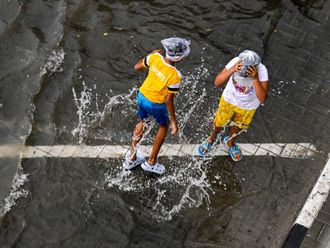Dubai: In every natural disaster that claims lives, children, especially those who get separated from their family, are the most vulnerable.
The children of Nepal are no exception. With more than 3,000 people dead as of Monday after the 7.9 magnitude quake that hit on Saturday, nearly a million children need urgent humanitarian assistance, figures from Unicef show.
SOS Children’s Villages, a global child care organisation that has an office in Dubai, said the children have been directly impacted by the disaster.
“We know first-hand the devastating effects on children and families natural disasters can have. Homes and livelihoods are lost; oftentimes children may lose parents and family members,” Nicole Nassar, Managing Director, Gulf Area office in Dubai, said.
SOS Children’s Villages has been in Nepal for the past 42 years. The organisation has been serving some 10,000 children and adults through family strengthening programmes, and also providing direct family-based care, education and health care for more than 1,500 children and young people who have lost parental care.
When the earthquake struck, Nassar said 800 of their ground personnel immediately mobilised efforts to rescue and care for children.
Seven SOS Children’s Villages are located within 50km of the area hardest hit by the earthquake. Its three villages in Sanothimi, Jorpati and Kavre are the closest to the earthquake’s epicentre.
Speaking to Gulf News from Nepal, Shankar Pradhananga, National Director of SOS Children’s Villages — Nepal, said they opened up their villages to receive and aid victims immediately after the quake.
“We had formed a committee for the rescue … to quickly respond to the affected areas with the collaboration of government and Red Cross Society. Thirty children have been receiving our care in camps since Sunday,” Pradhananga said. “As of now, primary treatments have been provided to the victims.”
Pradhananga said no one expected the extent of the damages to be that massive.
“The earthquake hit heavily populated areas of Nepal. It massively hit the Kathmandu valley and surrounding areas as well. The impact is far beyond our imagination.”
The challenge now is providing support and relief to unaccompanied children who were separated from their families. The organisation has been providing them with food, shelter, and psychosocial support to help them deal with post-traumatic stress.
“If both of parents are not alive then we bring them to our SOS family. If the situation of parents is not known then we will support them with the temporary care for six months and reunite with their family if they are met, if not, then we will take care for them in our SOS Children’s Villages,” Pradhananga said.
Pradhananga said the general public can help them in many ways by making online donations, sponsoring a child, becoming a “village friend” or a volunteer.
To learn more and help, visit http://www.sos-childrensvillages.org/












